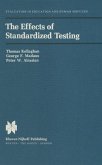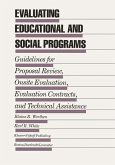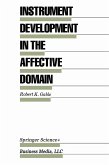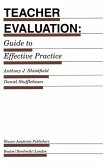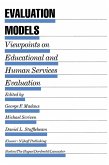D. L. Stufflebeam, Anthony J. Shinkfield
Systematic Evaluation (eBook, PDF)
A Self-Instructional Guide to Theory and Practice
40,95 €
40,95 €
inkl. MwSt.
Sofort per Download lieferbar

20 °P sammeln
40,95 €
Als Download kaufen

40,95 €
inkl. MwSt.
Sofort per Download lieferbar

20 °P sammeln
Jetzt verschenken
Alle Infos zum eBook verschenken
40,95 €
inkl. MwSt.
Sofort per Download lieferbar
Alle Infos zum eBook verschenken

20 °P sammeln
D. L. Stufflebeam, Anthony J. Shinkfield
Systematic Evaluation (eBook, PDF)
A Self-Instructional Guide to Theory and Practice
- Format: PDF
- Merkliste
- Auf die Merkliste
- Bewerten Bewerten
- Teilen
- Produkt teilen
- Produkterinnerung
- Produkterinnerung

Bitte loggen Sie sich zunächst in Ihr Kundenkonto ein oder registrieren Sie sich bei
bücher.de, um das eBook-Abo tolino select nutzen zu können.
Hier können Sie sich einloggen
Hier können Sie sich einloggen
Sie sind bereits eingeloggt. Klicken Sie auf 2. tolino select Abo, um fortzufahren.

Bitte loggen Sie sich zunächst in Ihr Kundenkonto ein oder registrieren Sie sich bei bücher.de, um das eBook-Abo tolino select nutzen zu können.
Zur Zeit liegt uns keine Inhaltsangabe vor.
- Geräte: PC
- ohne Kopierschutz
- eBook Hilfe
- Größe: 31.13MB
Andere Kunden interessierten sich auch für
![The Effects of Standardized Testing (eBook, PDF) The Effects of Standardized Testing (eBook, PDF)]() T. KelleghanThe Effects of Standardized Testing (eBook, PDF)40,95 €
T. KelleghanThe Effects of Standardized Testing (eBook, PDF)40,95 €![Evaluating Educational and Social Programs (eBook, PDF) Evaluating Educational and Social Programs (eBook, PDF)]() Blaine R. WorthenEvaluating Educational and Social Programs (eBook, PDF)40,95 €
Blaine R. WorthenEvaluating Educational and Social Programs (eBook, PDF)40,95 €![Instrument Development in the Affective Domain (eBook, PDF) Instrument Development in the Affective Domain (eBook, PDF)]() Robert K. GableInstrument Development in the Affective Domain (eBook, PDF)40,95 €
Robert K. GableInstrument Development in the Affective Domain (eBook, PDF)40,95 €![Curriculum, Community, and Urban School Reform (eBook, PDF) Curriculum, Community, and Urban School Reform (eBook, PDF)]() B. FranklinCurriculum, Community, and Urban School Reform (eBook, PDF)72,95 €
B. FranklinCurriculum, Community, and Urban School Reform (eBook, PDF)72,95 €![Lifeworlds and Change in Palestinian Education (eBook, PDF) Lifeworlds and Change in Palestinian Education (eBook, PDF)]() Bill WilliamsonLifeworlds and Change in Palestinian Education (eBook, PDF)41,95 €
Bill WilliamsonLifeworlds and Change in Palestinian Education (eBook, PDF)41,95 €![Teacher Evaluation (eBook, PDF) Teacher Evaluation (eBook, PDF)]() Anthony J. ShinkfieldTeacher Evaluation (eBook, PDF)160,95 €
Anthony J. ShinkfieldTeacher Evaluation (eBook, PDF)160,95 €![Evaluation Models (eBook, PDF) Evaluation Models (eBook, PDF)]() Evaluation Models (eBook, PDF)40,95 €
Evaluation Models (eBook, PDF)40,95 €-
-
-
Zur Zeit liegt uns keine Inhaltsangabe vor.
Dieser Download kann aus rechtlichen Gründen nur mit Rechnungsadresse in A, B, BG, CY, CZ, D, DK, EW, E, FIN, F, GR, HR, H, IRL, I, LT, L, LR, M, NL, PL, P, R, S, SLO, SK ausgeliefert werden.
Produktdetails
- Produktdetails
- Verlag: Springer Netherlands
- Seitenzahl: 368
- Erscheinungstermin: 6. Dezember 2012
- Englisch
- ISBN-13: 9789400956568
- Artikelnr.: 44060128
- Verlag: Springer Netherlands
- Seitenzahl: 368
- Erscheinungstermin: 6. Dezember 2012
- Englisch
- ISBN-13: 9789400956568
- Artikelnr.: 44060128
- Herstellerkennzeichnung Die Herstellerinformationen sind derzeit nicht verfügbar.
1 Introduction to Evaluation.- Objectives.- What Is Evaluation?.- Methods.- Standards.- History.- Roles in Evaluation Work.- Knowledge Test for Unit 1.- Application Exercise.- Questions Without Answers.- References.- 2 An Analysis of Alternative Approaches to Evaluation.- Objectives.- Alternative Conceptualizations of Evaluation.- Pseudoevaluation.- Quasievaluations.- True Evaluations.- Conclusion.- Knowledge Test for Unit 2.- Application Exercises.- Questions Without Answers.- References.- 3 Objectives-oriented Evaluation: The Tylerian Tradition.- Objectives.- The Intention of the Tylerian Approach.- Some Limitations of the Tylerian Approach.- Metfessel and Michael: An Extension of the Tylerian Approach.- Knowledge Test for Unit 2.- Application Exercises.- Questions Without Answers.- References.- 4 Edward A. Suchman and the Scientific Approach to Evaluation.- Objectives.- Conceptual Aspects of Evaluation.- Methodological Aspects of Evaluation.- Evaluation and Program Administration.- Knowledge Test for Unit 4.- Questions Without Answers.- References.- 5 Cronbach's Designing Evaluations: A Synopsis.- Objectives.- to the Issues.- Cronbach's Concepts of the Elements in an Evaluation Design: Uto.- Planning for Communication.- The Promise of Evaluation.- Knowledge Test for Unit 5.- Application Exercises.- Questions Without Answers.- References.- 6 Stufflebeam's Improvement-oriented Evaluation.- Objectives.- Some Personal History.- Development of the CIPP Model.- The PDK Study Committee's Elaboration of CIPP Evaluation.- CIPP Compared to Other Recent Evaluation Proposals.- CIPP as a Strategy for Improving Systems.- An Overview of CIPP Categories.- Designing Evaluations.- Metaevaluation and Standards.- Conclusion.- Knowledge Test for Unit 6.- Application Exercises.-Questions Without Answers.- References.- 7 Stake's Client-centered Approach to Evaluation.- Objectives.- The Countenance Statement of Evaluation.- Format for Data Collection.- Responsive Evaluation.- General Observations.- Knowledge Test for Unit 7.- Application Exercises.- Questions Without Answers.- References.- 8 T.R. Owens, R.L. Wolf: An Adversary Approach to Evaluation.- Objectives.- Intention of the Adversary Model.- One Form of the Adversary Approach: Wolf's Judicial Model.- Pros and Cons of Adversary Evaluation.- Knowledge Test for Unit 8.- Application Exercises.- Questions Without Answers.- References.- 9 Illuminative Evaluation: The Holistic Approach.- Objectives.- Traditional Evaluation: Seeds of Doubt.- Stake's Concept of Evaluation as Portrayal.- Illuminative Evaluation: A Social-Anthropological Paradigm.- The Context of Educational Programs.- Organization and Methods of Illuminative Evaluation.- Reporting and Decision Making.- Problems Associated with Illuminative Evaluation.- Knowledge Test for Unit 9.- Application Exercises.- Questions Without Answers.- References.- 10 Michael Scrlven's Consumer-Oriented Approach to Evaluation.- Objectives.- Evaluation Defined.- Critique of Other Persuasions.- Formative and Summative Evaluation.- Amateur versus Professional Evaluation.- Intrinsic and Payoff Evaluation.- Goal-free Evaluation.- Needs Assessment.- The Key Evaluation Checklist.- Metaevaluation.- Evaluation Ideologies.- Professionalization of Evaluation.- Knowledge Test for Unit 10.- Application Exercises.- Questions Without Answers.- References.- Indexes.
1 Introduction to Evaluation.- Objectives.- What Is Evaluation?.- Methods.- Standards.- History.- Roles in Evaluation Work.- Knowledge Test for Unit 1.- Application Exercise.- Questions Without Answers.- References.- 2 An Analysis of Alternative Approaches to Evaluation.- Objectives.- Alternative Conceptualizations of Evaluation.- Pseudoevaluation.- Quasievaluations.- True Evaluations.- Conclusion.- Knowledge Test for Unit 2.- Application Exercises.- Questions Without Answers.- References.- 3 Objectives-oriented Evaluation: The Tylerian Tradition.- Objectives.- The Intention of the Tylerian Approach.- Some Limitations of the Tylerian Approach.- Metfessel and Michael: An Extension of the Tylerian Approach.- Knowledge Test for Unit 2.- Application Exercises.- Questions Without Answers.- References.- 4 Edward A. Suchman and the Scientific Approach to Evaluation.- Objectives.- Conceptual Aspects of Evaluation.- Methodological Aspects of Evaluation.- Evaluation and Program Administration.- Knowledge Test for Unit 4.- Questions Without Answers.- References.- 5 Cronbach's Designing Evaluations: A Synopsis.- Objectives.- to the Issues.- Cronbach's Concepts of the Elements in an Evaluation Design: Uto.- Planning for Communication.- The Promise of Evaluation.- Knowledge Test for Unit 5.- Application Exercises.- Questions Without Answers.- References.- 6 Stufflebeam's Improvement-oriented Evaluation.- Objectives.- Some Personal History.- Development of the CIPP Model.- The PDK Study Committee's Elaboration of CIPP Evaluation.- CIPP Compared to Other Recent Evaluation Proposals.- CIPP as a Strategy for Improving Systems.- An Overview of CIPP Categories.- Designing Evaluations.- Metaevaluation and Standards.- Conclusion.- Knowledge Test for Unit 6.- Application Exercises.-Questions Without Answers.- References.- 7 Stake's Client-centered Approach to Evaluation.- Objectives.- The Countenance Statement of Evaluation.- Format for Data Collection.- Responsive Evaluation.- General Observations.- Knowledge Test for Unit 7.- Application Exercises.- Questions Without Answers.- References.- 8 T.R. Owens, R.L. Wolf: An Adversary Approach to Evaluation.- Objectives.- Intention of the Adversary Model.- One Form of the Adversary Approach: Wolf's Judicial Model.- Pros and Cons of Adversary Evaluation.- Knowledge Test for Unit 8.- Application Exercises.- Questions Without Answers.- References.- 9 Illuminative Evaluation: The Holistic Approach.- Objectives.- Traditional Evaluation: Seeds of Doubt.- Stake's Concept of Evaluation as Portrayal.- Illuminative Evaluation: A Social-Anthropological Paradigm.- The Context of Educational Programs.- Organization and Methods of Illuminative Evaluation.- Reporting and Decision Making.- Problems Associated with Illuminative Evaluation.- Knowledge Test for Unit 9.- Application Exercises.- Questions Without Answers.- References.- 10 Michael Scrlven's Consumer-Oriented Approach to Evaluation.- Objectives.- Evaluation Defined.- Critique of Other Persuasions.- Formative and Summative Evaluation.- Amateur versus Professional Evaluation.- Intrinsic and Payoff Evaluation.- Goal-free Evaluation.- Needs Assessment.- The Key Evaluation Checklist.- Metaevaluation.- Evaluation Ideologies.- Professionalization of Evaluation.- Knowledge Test for Unit 10.- Application Exercises.- Questions Without Answers.- References.- Indexes.

